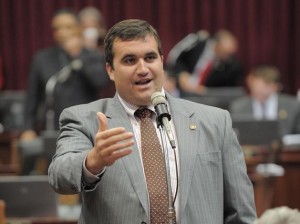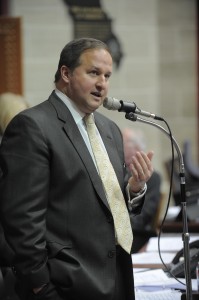Questions by Scott Faughn and Ashley Jost
For more information about the Speaker’s race, check out the Missouri Times story when Jones announced.
[divider style=”tiny”][/divider]
The Missouri Times: What made you want to run?
Caleb Jones: I looked at the direction our caucus was headed with a top-down leadership structure and it concerned me. I had some colleagues that came to me and expressed the same concern. I want to make sure the caucus continues a bottom-up leadership structure rather than top-down where only two or three people are making the decisions.
TMT: Can you tell me a little bit about your work with the minority too?
Jones: I think a lot of good ideas come from all members of the House. I don’t think we should stifle any member for trying to go out and do the best for their district. We all have 36,000 people that we represent and I think any idea we need to sit and take a look at and see if it’s best for our state.

TMT: How has Tim [Jones] been helpful or a guide to you so far?
Jones: I don’t expect Tim to get involved in this race at all. He needs to do his job as Speaker, running the House of Representatives. Obviously, this probably will bring some interesting discussions over Thanksgiving. But I’m focused on where the future of our caucus is headed and how our House operates and what leadership structure we’ll have.
TMT: What would be some of the changes you would want to make if you’re elected?
Jones: I think that we need to give committee chairmen the power and ability to pass legislation they think is important. Probably most importantly, really give the caucus members a voice in what our caucus priorities are and what our legislation is. This is a leadership structure discussion more so than any policy or procedure. I think a lot of times, legislation is often stifled by people waiting their turn to move up in leadership and I think we as a caucus need to work on passing good legislation, helping the state move forward, rather than waiting in line.
TMT: When did you make the decision that you were going to run? Was there any specific moment or something that happened that made you decide this was what you wanted to do?
Jones: I really started to analyze where our caucus and where our state was headed whenever my wife became pregnant. I really started to look at what kind of future I was going to leave for my son and what kind of legacy I want the Missouri House of Representatives to have, and you know at time of reflection you often see a lot more clearer. This past year I’ve watched the House be steered toward a top-down leadership mentality and I don’t think a lot of the voice in our caucus that should be heard are being heard. All members of our caucus, we’re all elected by 36,000 people; 36,000 people ask them to come up here and do what’s best for their district and best for our state. I think too often that’s forgotten.
TMT: You mentioned a top-down structure. Is that a little bit hard to say because someone you’re personally close to and related to is the Speaker?
Jones: Absolutely, but this is a structure that’s been in place for a long time, and it isn’t about our current Speaker. It’s about the leadership structure that our House has and the direction that our House is going to go.
TMT: If you were handed the pencil, what would the structure look like under Speaker Caleb Jones?
Jones: I think we would have a structure where caucus members would be able to openly discuss ideas and concepts, openly debate and educate each other on legislation and as a caucus determine what our priorities are. And also, allow our caucus members to speak up when necessary and spend time as a caucus educating our self not just on fundamental structures of the Republican Party but fundamental structures of where we want our state to go.
TMT: Can you tell our readers who you reached out to for advice before you made the decision?
Jones: I actually had a lot of representatives come to me and ask me questions about how to get their legislation heard and passed. That really got me thinking about how our legislation becomes priority in the House and where our legislation goes. It was really a hands-on decision I made. I watched some great ideas move through the House and I realized there were probably a lot of ideas that get missed by caucus members that are doing a great job but aren’t being heard. That made me aware of the problem we have.
TMT: Did you reach out to anyone else?
Jones: I talked to my wife a lot about it and I talked to my dad. He has obviously been in the legislature, has had good and bad experiences in the legislature and was really open and honest with me on what he thought the issues were and what he thought was good.
TMT: How do you think your dad is going to help you even more when you move forward in this race?
Jones: I think a lot of times, representatives who have served in the House really don’t get that moment of reflection until they’re out. That’s when the ‘what ifs’ happen. Being able to pick up the phone and call him and ask what he would do if he could do it again. That’s been very, very helpful for me.
TMT: There’s another legislator in the House who has been discussed as potentially running for Majority Leader. How do you see Todd [Richardson] playing into this? Have you had any discussions with him about the race?
Jones: Todd is a very good friend of mine. We both want what’s best for our caucus. We’ve talked about my race, the Speaker’s race, a little bit and the issues that the House has.
TMT: You’re both members of that huge class, almost bigger than the other three combined. Did that factor into your decision? Sometimes those classes stick together, going through a lot of the same experiences.
Jones: No, it didn’t. What factored into my decision is the direction we were headed and that affects every member.
TMT: Do you think there’s an advantage though?
Jones: I don’t think what class I’m in matters. I don’t think the members really look at what class someone’s in when they’re trying to determine what direction the caucus is going. I really think our members are going to make their decision based on the direction we’re headed and what they want to see the caucus headed.
TMT: Personal relationships seem to be a key thing in the House. Some of the votes [on some issues] seem to be personal relationship votes. A leadership race seems very similar. How important have your relationships been just in the first few weeks you’ve been campaigning?
Jones: You know, members of our caucus want a leader that they trust, that they know, that they know they can rely on to be a good voice for their caucus. I think members know that I’m trustworthy and my word’s my bond and I’m going to work tirelessly for them.

TMT: Where do you think the vote is now? Do you think you have enough support if the vote was today?
Jones: Absolutely. I spent a lot of time thinking about this, talking to members of the House and listening to members of the House. I wouldn’t have made such a large jump into this if I didn’t know the votes were there.
TMT: Do seniors get to vote?
Jones: That’s all going to be determined over August caucus. One time seniors voted, another time they didn’t.
TMT: What are some of the things you’ve been doing to campaign so far?
Jones: Members want to hear what you’re envisioning for the caucus. I’ve spent a lot of time on my phone and in my car, meeting with members all over the state and discussing where they would like to see the caucus go and what they think is important for a leader in our caucus.
TMT: What have you learned so far?
Jones: I think the most important thing is that our caucus needs a voice and needs to be heard. We need to be included in the decisions that are being made, not just a few people.
TMT: You could be a four-year speaker, which we haven’t seen since Rod [Jetton], do you have any concerns about being a four-year speaker or do you have plans to be a four-year speaker? There’s been some talk about your running for higher office too?
Jones: The Speaker’s office is a two-year term. I plan on serving my two years and talking to the caucus and seeing what’s best for the caucus. I have no intentions of running for any statewide office in 2016. That’s been something I wanted to make sure the caucus knew. While I’m Speaker I plan on focusing on making the House the best legislative process we can have.
TMT: If you’re Speaker, will the House vote on “right to work” legislation?
Jones: This isn’t about issues. This is about the process that the caucus travels to to find out what issues are important to the caucus. The job of the Speaker is be exactly what the title is: the speaker of the caucus. With any issue, we as a caucus need to decide if we’re going to pass it, and then I think it’s the Speaker’s role to make sure that legislation becomes priority and moves through the House as efficiently as possible. I’ve had members ask me policy questions and I’ve told all of them that this is an issue the caucus needs to decide on as a whole. I think the caucus is going to discuss if it’s a priority.
TMT: What would that caucus process be like?
Jones: With any issue, having such a large, supermajority caucus, I think there will be some individuals who have some concerns with any piece of legislation. There will be some people who will express concerns. I think that’s good for a caucus. Being able to discuss issues and determine what our priorities are and caucus members knowing they will actually be heard, they will actually have a voice in the process is really the most important thing. Whenever somebody asks a leader what his priorities are, I think that the leader, the speaker, should defer to the caucus. We haven’t sat down as a caucus and discussed those yet but I look forward to that.
TMT: What would be your thoughts on a piece of legislation like education reform that didn’t whip at 82 that you’d bring to the floor? Would you put things on the floor that don’t have 83 Republican votes?
Jones: I think that’s something the caucus needs to determine before we go into a legislative session. There are a lot of different ideas and goals from each member for their district and the state. We as a caucus need to determine what is the process to pass a bill.
TMT: What’s the process now?
Jones: The process right now is top-down leadership structure where a few people are making the decisions and the voice of the caucus isn’t being heard.
TMT: On education reform it seemed as though it wasn’t. Was that something you paid close attention to and would like to avoid?
Jones: I think that a good leader will listen to his caucus and determine what’s important and best for the caucus with the caucus input.
TMT: There was a situation this session where a couple of people were removed off of committees. Is that a tactic you would take as Speaker?
Jones: I think that any decisions on situations like that need to be brought before the caucus and discuss.
TMT: So if you didn’t have the majority of support from the caucus you wouldn’t remove people from committees?
Jones: I think that’s something we should have the caucus discuss and determine what to do in situations like that.
TMT: Have you picked a person that you support for [Speaker] Pro Tem?
Jones: I have not. I think that both individuals are very capable, very good leaders and both would do an excellent job.

TMT: Have you called John Diehl since you announced?
Jones: I called him before I announced so that he was aware of it. He didn’t answer and I left him a message leaving him my cell number and asking him to call me back.
TMT: Was that a tough call to make?
Jones: No. I’m a pretty open and upfront guy. I’m not trying to hide the ball.
TMT: What do you think this does to next year’s session, this leadership race?
Jones: I think that this discussion on where our leadership is headed is going to help our caucus become stronger and help us find our voice.
TMT: What role do you think fundraising will take in this leadership race?
Jones: I think that the most important aspect of this race is meeting with members, talking with them and letting them see my vision of where the caucus should be.
TMT: If you’re the Speaker, you’re the head fundraiser. Do you think it’s important for people to see that you can fundraise?
Jones: I think it’s important for the caucus to know that you’re open and accessible and that you support members of your caucus. And I think that the Speaker’s job should be to support members of the caucus, legislatively and otherwise.
TMT: How many legislators have you talked with?
Jones: Almost all of them.
TMT: If you are unsuccessful with the caucus, would you look to work with the Democrat caucus in a power-sharing arrangement?
Jones: I think that our caucus is going to choose the right leader for the House of Representatives and I want to make sure our caucus’s voice is heard.
TMT: So is that a decision that you’ll abide by or is it an option to work with the Democrats if the caucus was fractured?
Jones: I think that our caucus is going to be stronger than ever and will have a much larger voice.
TMT: Is there a representative that’s supported you that’s surprised you?
Jones: I think what’s most surprising is that with any representative that I meet or talk to, they all agree that we need a bottom-up leadership style rather than top-down.
TMT: Is there a part of the state outside of mid-Missouri, where you’re from, that’s surprised you by the amount of support you’ve received?
Jones: No. You know, all the caucus members have been very open and honest with me about their concerns of what they would like to see.
TMT: If you’re successful in becoming the Speaker, what role would you see John Diehl having in his last term?
Jones: A valued member of our caucus, like every caucus member. He’s going to have an equal voice like everyone else and like everybody else should.
TMT: Do you have a team of four or five people that are kind of publicly supporting you on this or that you’re relying on?
Jones: I’ve had an outpouring of representatives across the state that have all wanted to help make our caucus stronger. It hasn’t been just four or five, it’s been a large group.
TMT: Is there anything that we didn’t talk about that you want to make sure that people know?
Jones: I think that this race for Speaker is going to give our caucus a voice and therefore give our caucus unity and more strength. I look forward to becoming Speaker and making sure our caucus has that voice.
Ashley Jost is no longer with The Missouri Times. She worked as the executive editor for several months, and a reporter before that.






